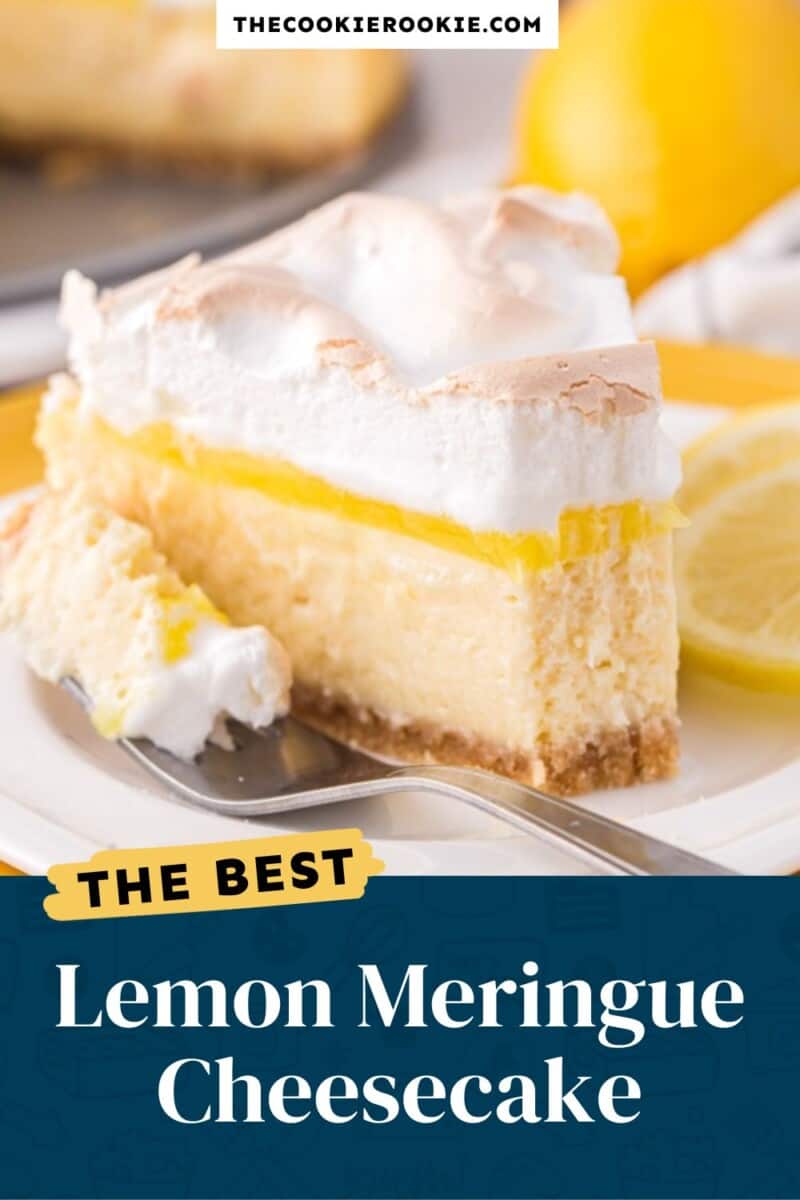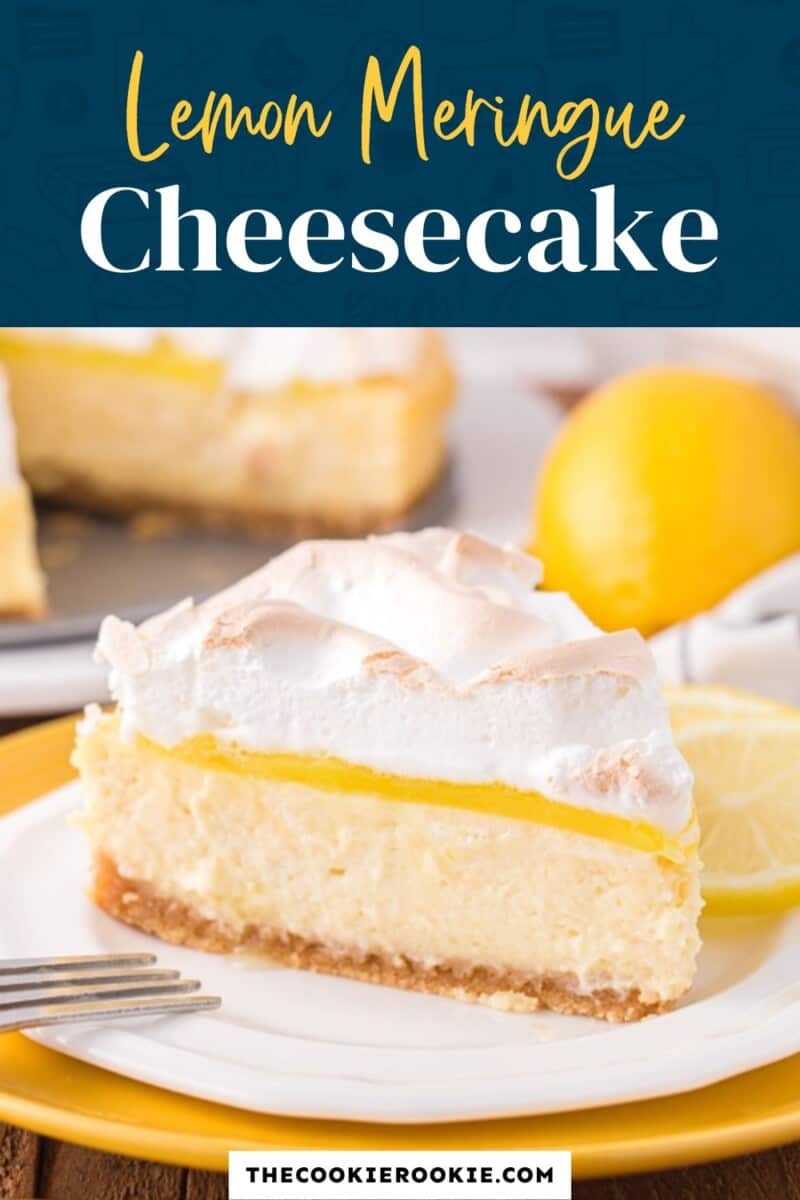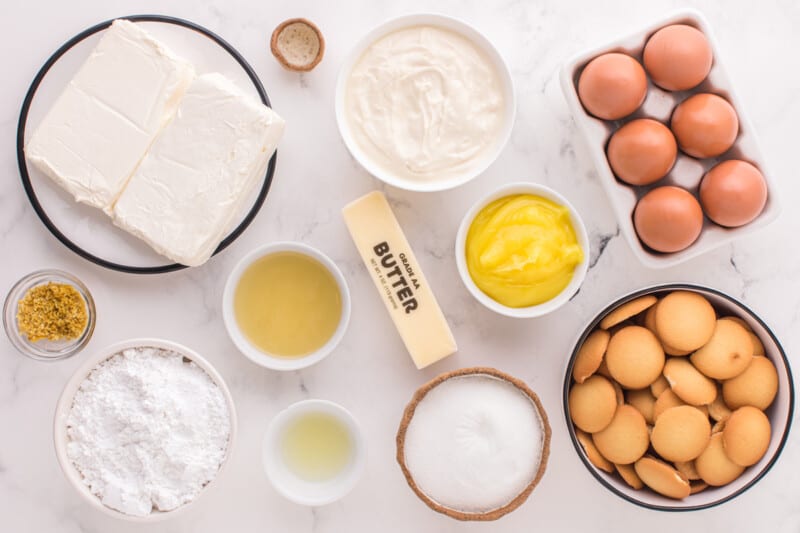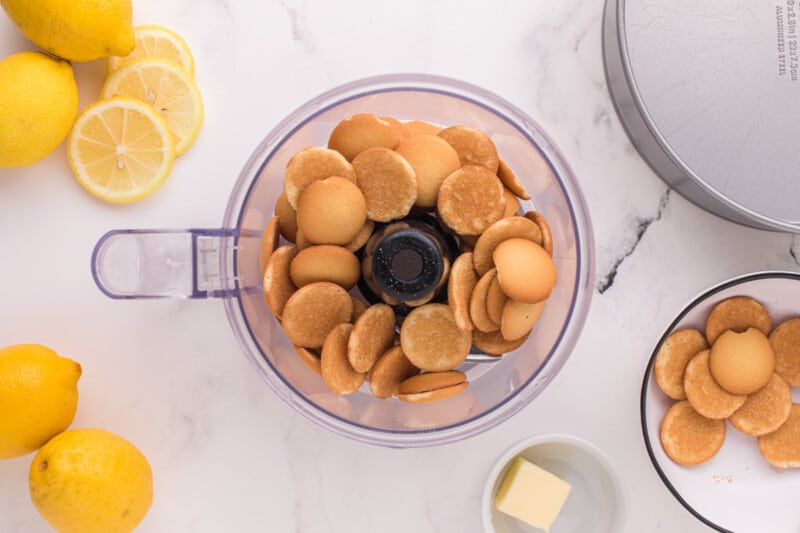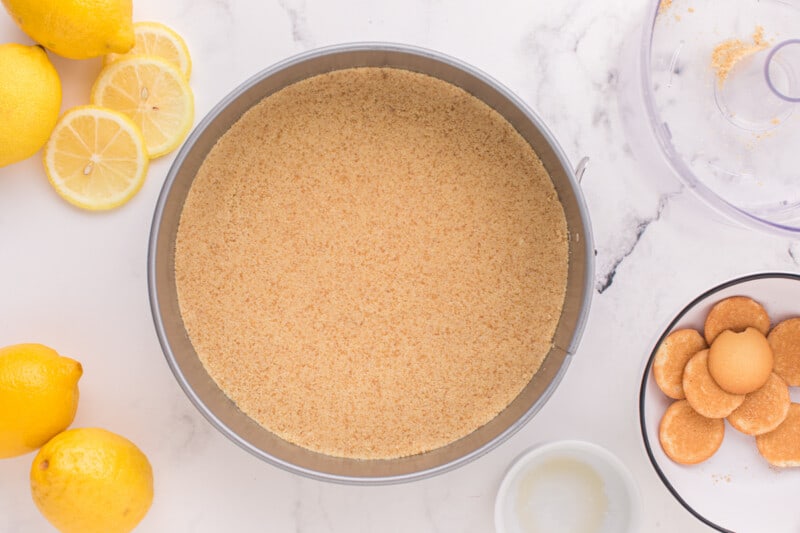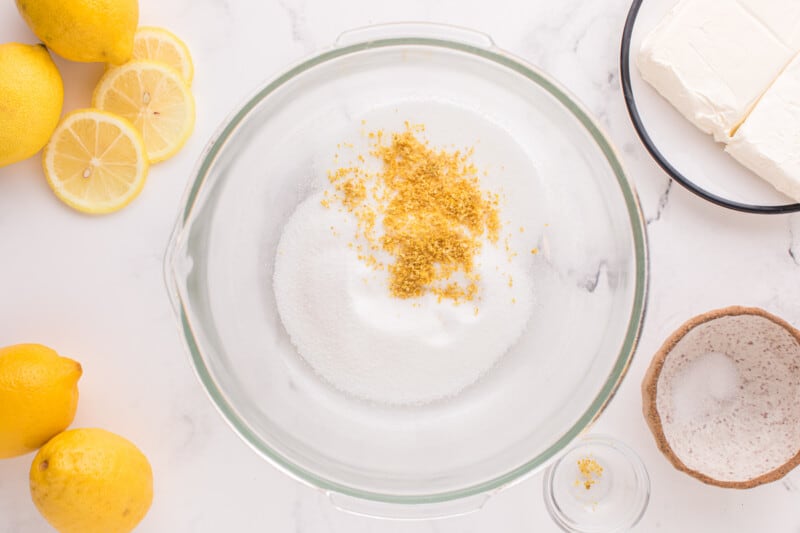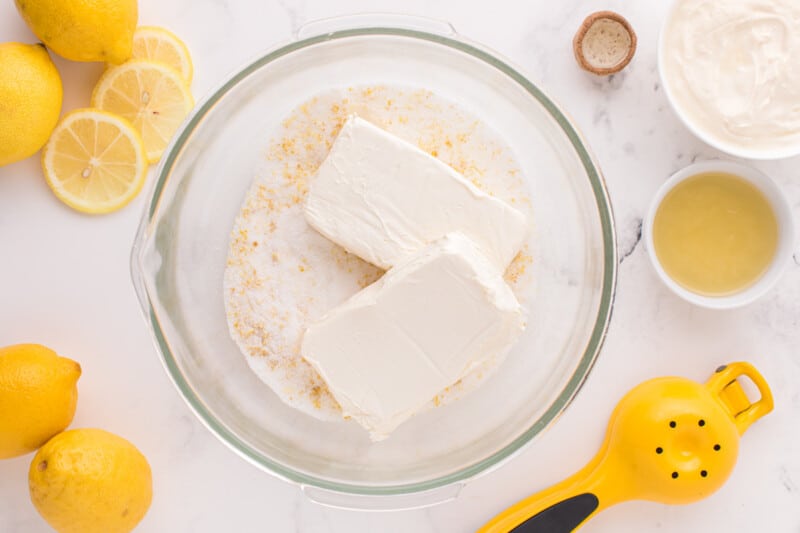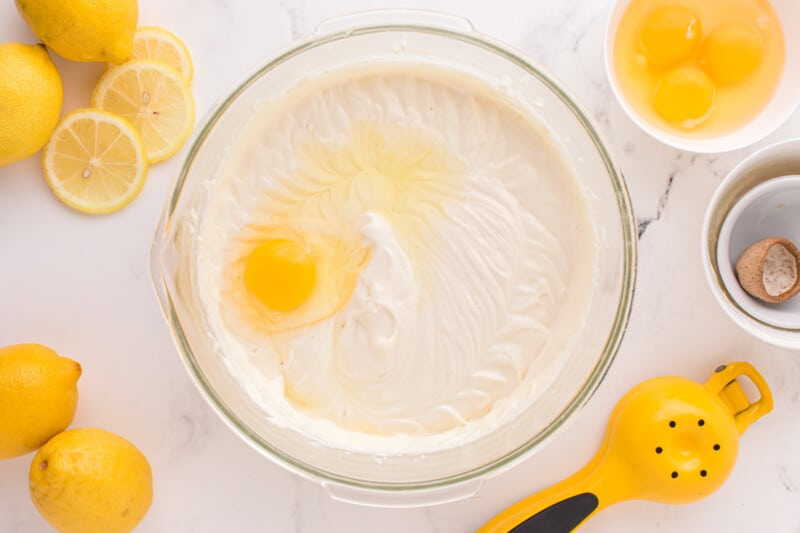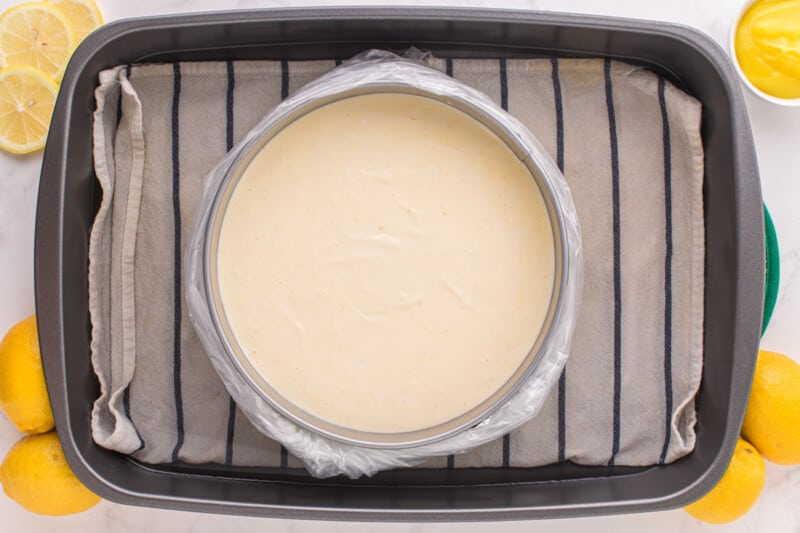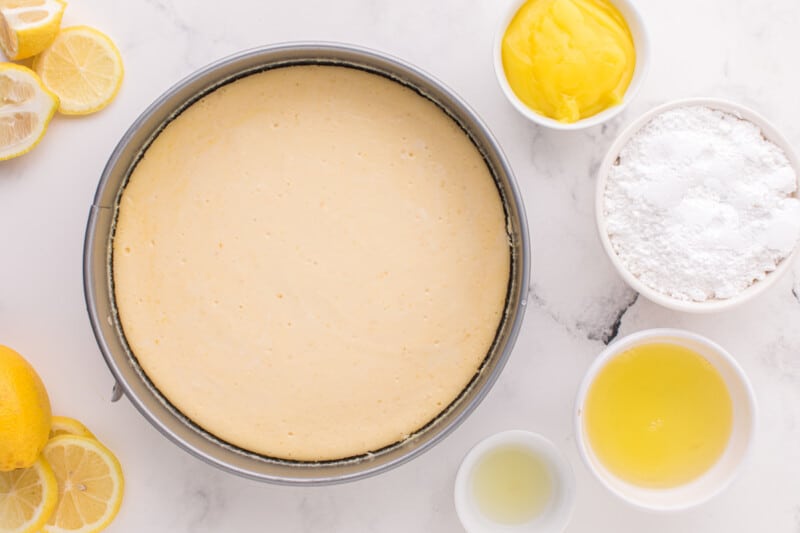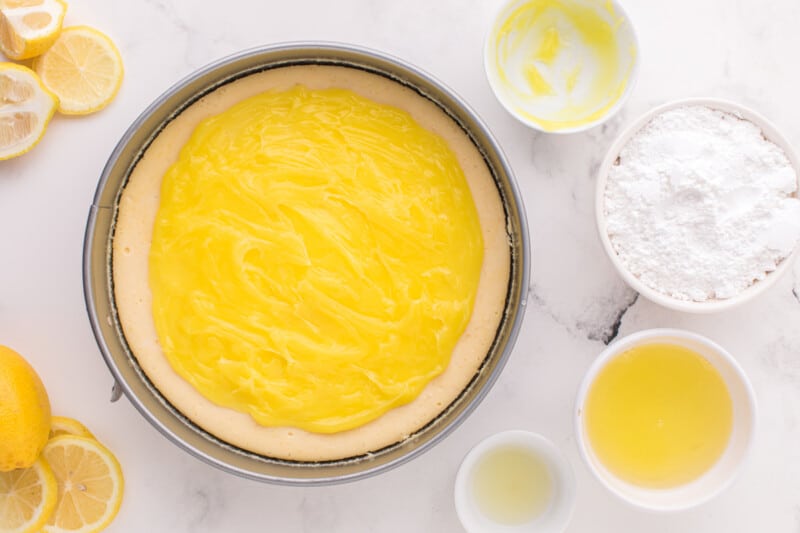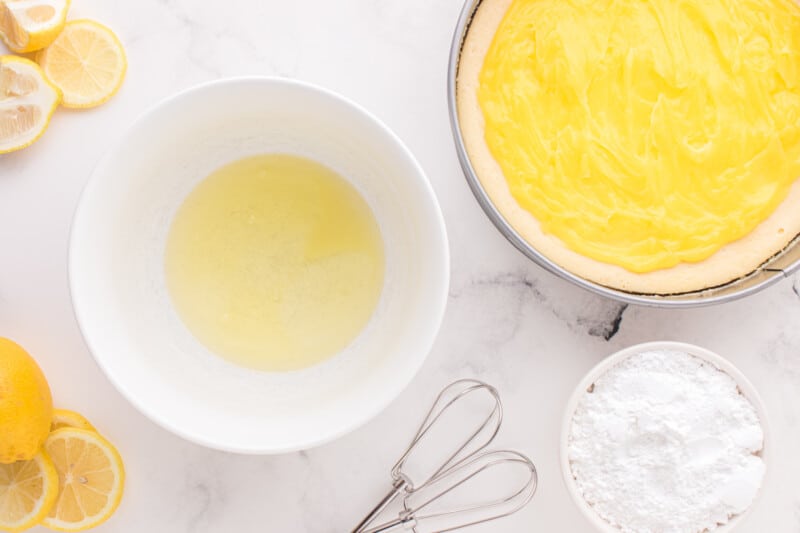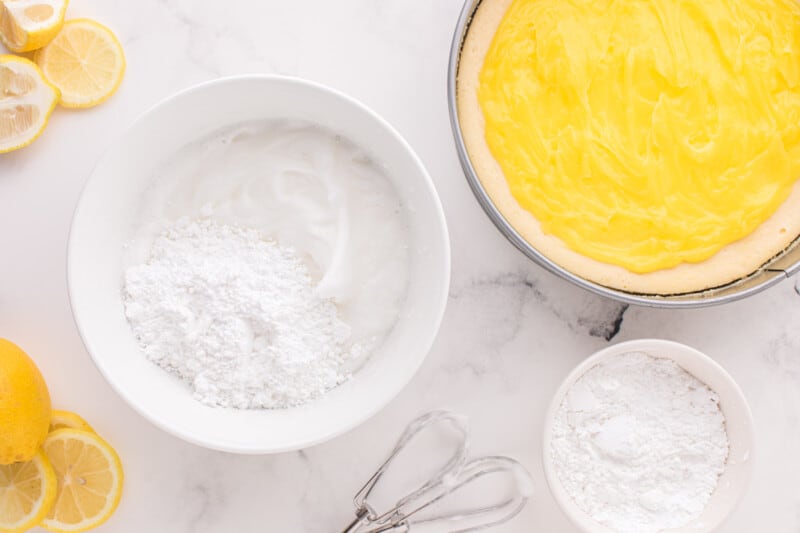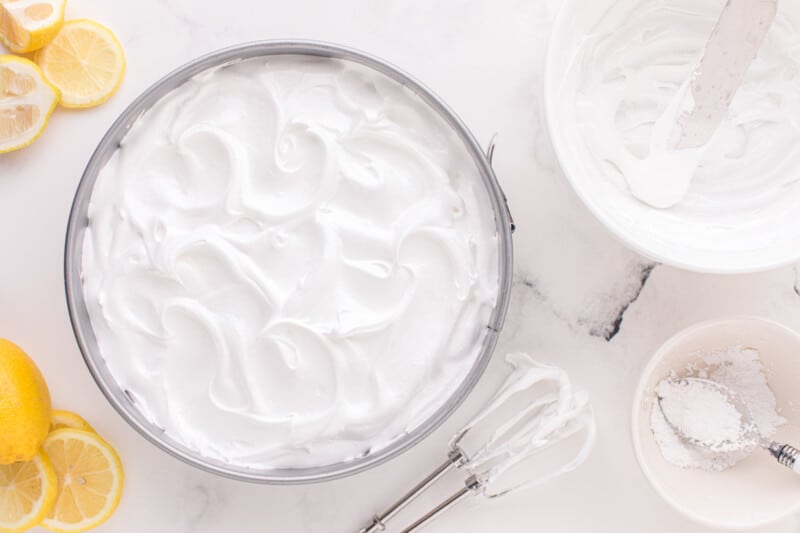Lemon Meringue Cheesecake combines the irresistible flavors of classic cheesecake, zesty lemon curd, and the airy sweetness of a fluffy meringue topping. A true showstopper, this light but decadent dessert is perfect for special occasions like Easter Sunday or just when you’re craving a slice of heaven.
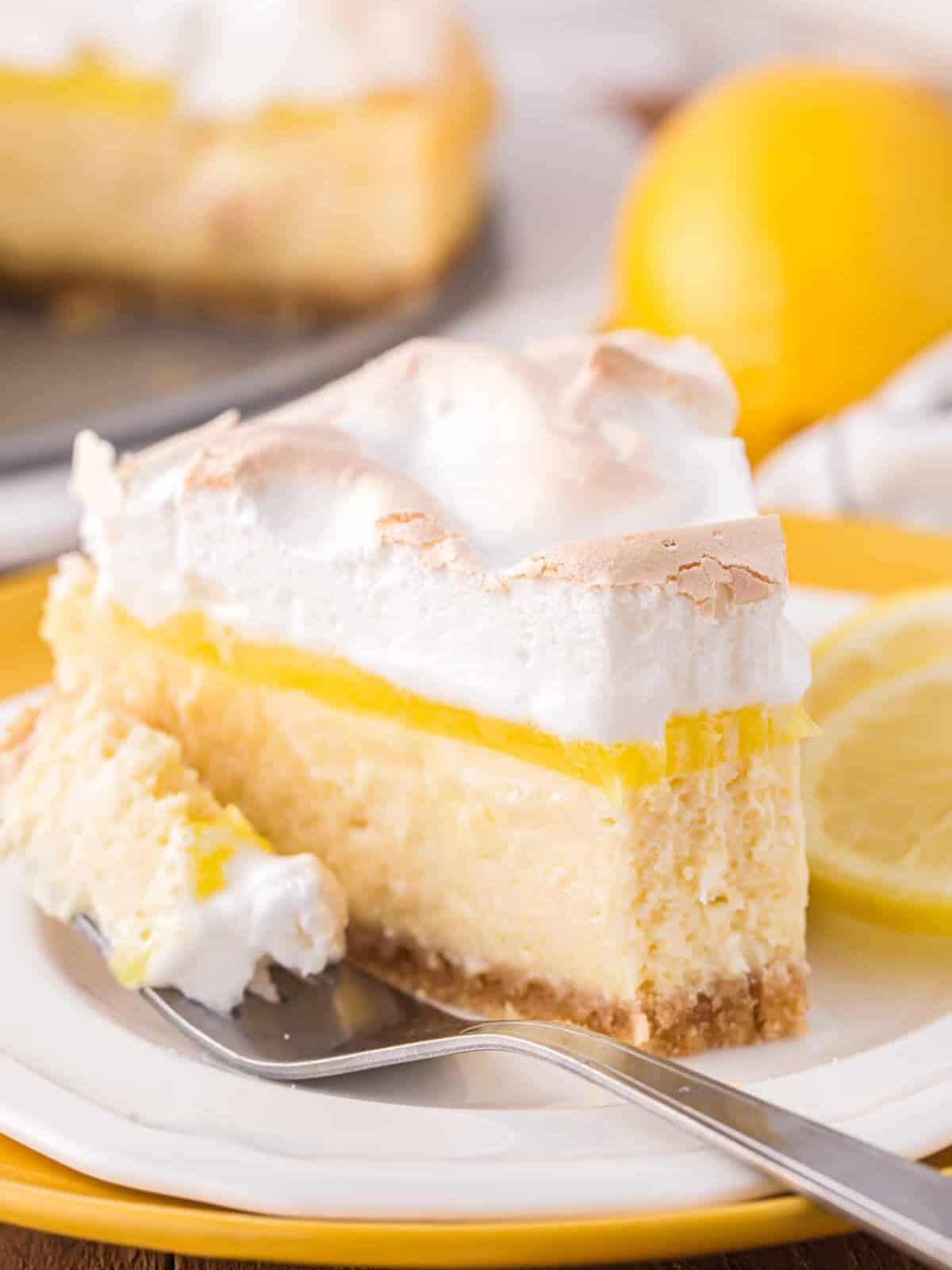
This post may include affiliate links that earn us a small commission from your purchases at no extra cost to you.
What’s in Lemon Curd Cheesecake?
From the vanilla wafer crust to the creamy lemon cheesecake filling and perfectly golden meringue topping, this tasty dessert has it all. Get ready to impress your friends and family with a truly delicious and refreshing lemon pie.
- Wafer Cookies: I like using vanilla wafer cookies for their neutral taste. You can also make this recipe with golden Oreos or a graham cracker crust.
- Butter: I used salted butter in the crust to bring out the flavor of the cookies. You can use unsalted butter instead.
- Sugar: Granulated sugar sweetens the cheesecake, while powdered sugar sweetens the meringue.
- Lemon: Lemon zest and juice give this cheesecake its bright flavor. You’ll need two whole lemons.
- Cream Cheese: Full-fat, brick-style cream cheese forms the base of this cheesecake. Let it soften before using.
- Greek Yogurt: Honey vanilla Greek yogurt adds a subtle flavor as well as a rich tanginess to cut the sweetness of the cheesecake. You can use plain or vanilla Greek yogurt instead.
- Lemon Extract: Helps enhance the lemony flavor of the cheesecake without making it too sour.
- Eggs: Whole eggs give the cheesecake structure, while egg whites give the meringue structure.
- Lemon Curd: Adds an extra layer of fresh citrus flavor. You can make it a few days in advance or use store-bought to save time.
Variations on Lemon Cheesecake
For a different spin on this classic lemon meringue cheesecake, try switching up the crust or the type of citrus. You could swap out the wafer cookies for golden Oreos, Biscoff cookies, or a graham cracker crust. For the filling, you could use limes, grapefruits, or blood oranges instead of lemons. If you switch up the citrus flavor, you’ll want to make your own curd, substituting the citrus of your choice in for the lemon.
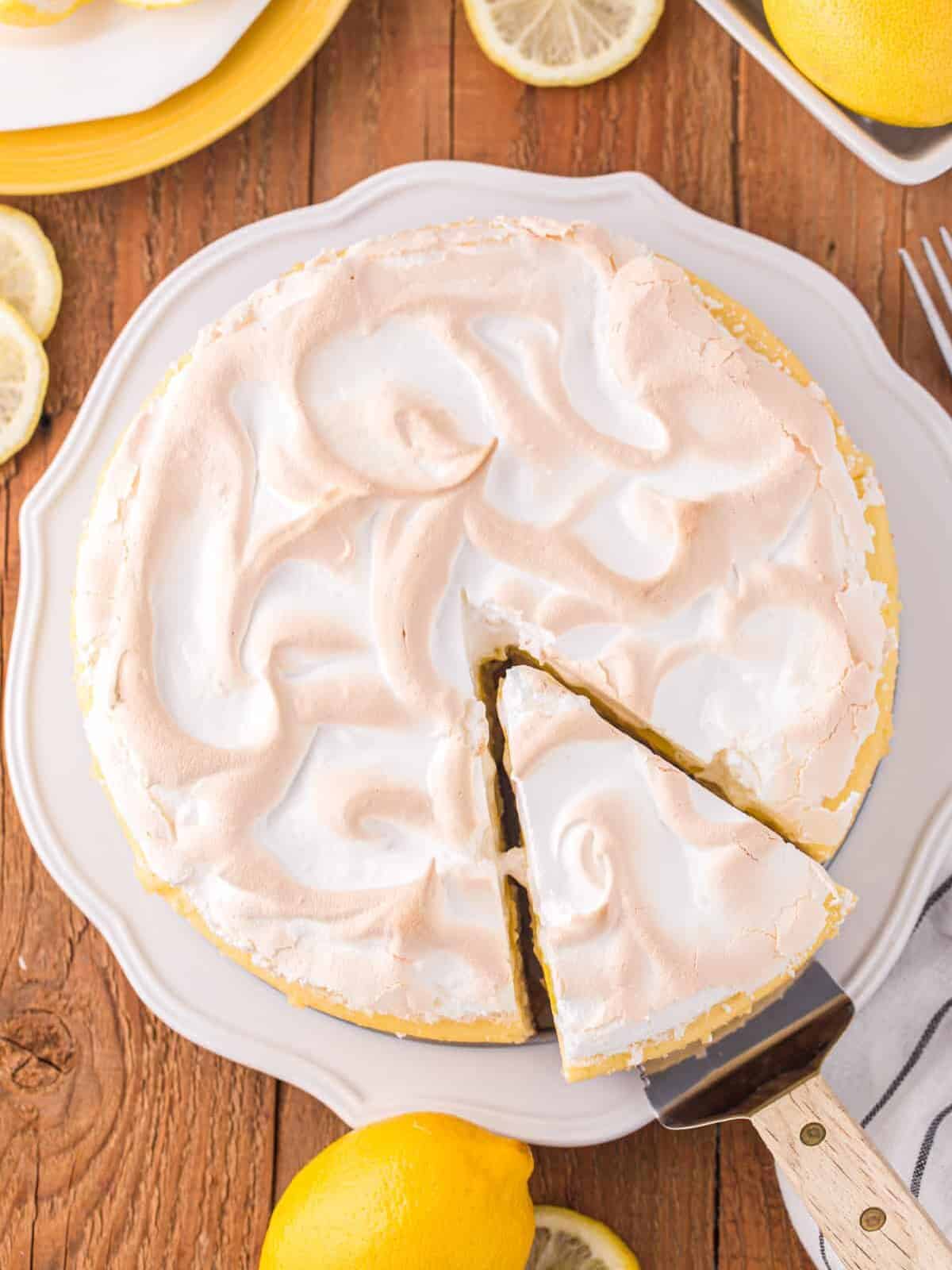
Cheesecakes require the use of a springform pan. This type of pan allows for even baking, easy release, and less mess. If you don’t have one, you should be able to pick one up at most stores in the aisle with other baking pans.
I do not recommend using fat-free ingredients to make this cheesecake, as it just won’t taste as rich and delicious. However, you can use light cream cheese or Neufchatel for a lower-fat alternative. This will change the flavor slightly.
Yes! This is a baked cheesecake recipe, and it will not turn out correctly unless it is baked in the oven. If you’re looking for a no-bake cheesecake recipe, try this no-bake lemon cheesecake.
If you want to keep the cheesecake from cracking, turn the oven off, and let it cool with the door closed for a minimum of 1 hour and a maximum of 3 hours.
Cheesecake should come out of the oven with a slightly jiggly center. It will take a few hours to cool and set properly, so don’t worry! If after baking, you press gently in the center of the cheesecake and runny batter comes off on your finger, it needs a bit longer to bake.
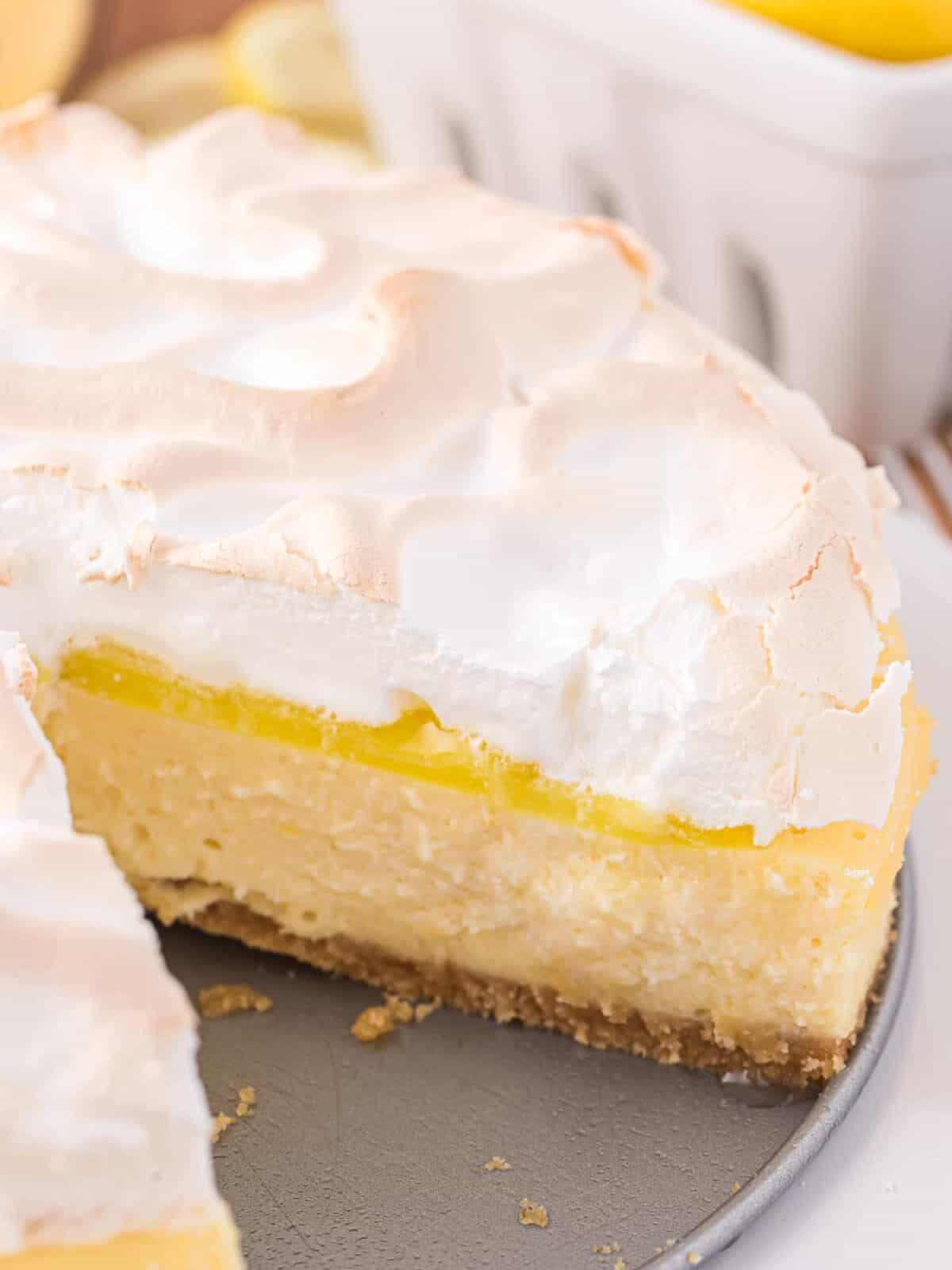
How to Make Ahead and Store Lemon Curd Cheesecake
The lemon curd can be made up to 1 week in advance and stored in an airtight container in the refrigerator. The cheesecake base can be made up to 2 days in advance and stored, tightly wrapped, in the refrigerator. I do not recommend making the meringue ahead of time.
While this lemon meringue cheesecake is best enjoyed fully assembled on the day it is made, it will keep for up to 3 days in an airtight container in the refrigerator. Serve cold.
How to Freeze Baked Meringue Cheesecake
I do not recommend freezing this cheesecake fully assembled, as neither the curd nor the meringue will freeze well. To freeze the cheesecake, tightly wrap it in 2 layers of plastic wrap and 1 layer of aluminum foil and freeze for up to 1 month. Allow it to thaw overnight in the refrigerator before topping with the curd and meringue.
What to Serve with Lemon Meringue Cheesecake
When it comes to serving Lemon Meringue Cheesecake Pie, simplicity is best to let the tangy and creamy flavors of the dessert shine. However, if you’re looking to elevate the presentation and flavor of your dessert, serve with a dollop of whipped cream with lemon zest grated over the top and a sprig of mint.
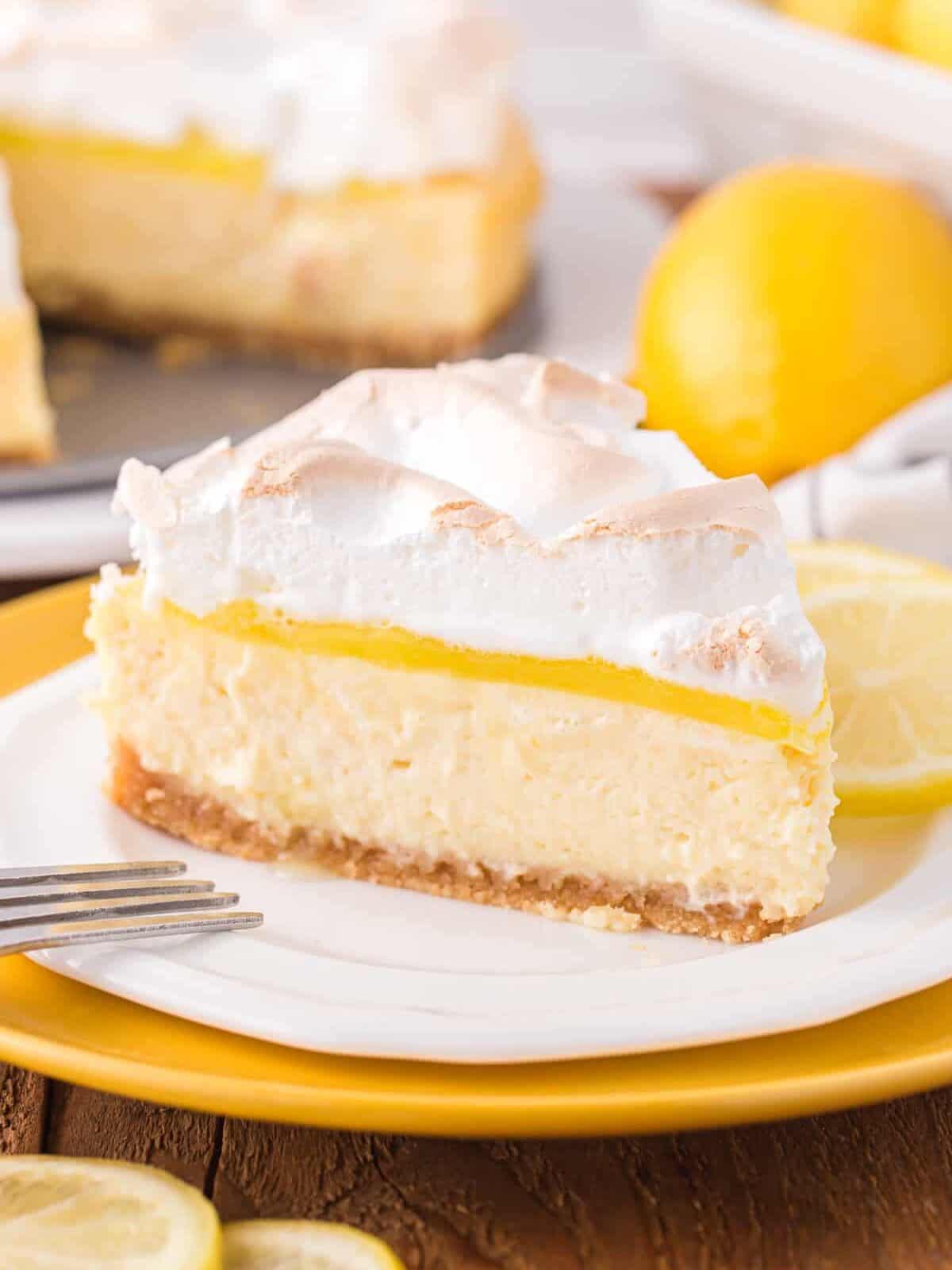
Lemon Meringue Cheesecake Recipe
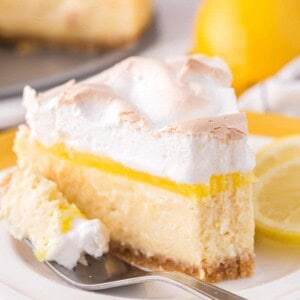
Equipment
- Kitchen Scale (optional)
- 9-inch Springform Pan
- Food Processor
- Hand Mixer OR
- Stand Mixer
Ingredients
For the Crust
- 3 cups vanilla wafer cookies 225 grams (about 60 cookies)
- ⅓ cup salted butter 75 grams, melted (⅔ stick)
For the Lemon Cheesecake
- ¾ cup granulated sugar 150 grams
- 1½ tablespoons lemon zest 3 grams, from about 2 lemons
- 24 ounces cream cheese 680 grams, room temperature (3 bricks)
- 1 cup honey vanilla Greek yogurt 227 grams, room temperature
- ¼ cup lemon juice 57 grams, from about 2 lemons
- 1 teaspoon lemon extract 4 grams
- 4 large eggs 200 grams, room temperature
- ½ cup lemon curd 170 grams, store-bought or homemade
For the Meringue
- 3 large egg whites 105 grams, room temperature
- 1½ teaspoons lemon juice 7 grams
- 1¼ cups powdered sugar 140 grams
Instructions
- Preheat oven to 350°F. Line the bottom of a 9-inch springform pan with parchment paper and spray the bottom and sides with nonstick spray. Set aside.
- Use a food processor to crush the vanilla wafer cookies to crumbs, about 1 minute.3 cups vanilla wafer cookies
- Add in the salted butter and pulse to combine. You should have a mixture with the consistency of wet sand.⅓ cup salted butter
- Press the crust into the springform pan.
- Bake the crust for 10-12 minutes, or until it just begins to brown.
- Reduce the oven to 300°F, remove the crust from the oven, and allow the crust to cool completely.
- While the crust is cooling, prepare a water bath by placing a lint free towel, folded, in the bottom of a roasting or large baking pan. You want a pan large enough for the springform pan to fit comfortably with a little space on all sides.
- Heat 4 cups of water in a kettle until boiling, turn off heat and allow it to set while you assemble the cheesecake.
- To make the cheesecake, beat together the sugar and lemon zest in a large mixing bowl with a hand or stand mixer until the sugar is fragrant, about 1 minute.¾ cup granulated sugar, 1½ tablespoons lemon zest
- Add in the cream cheese and beat on medium, just until light and fluffy, about 5-7 minutes, depending on the temperature of the cream cheese.24 ounces cream cheese
- Mix in the greek yogurt, lemon juice, and lemon extract until completely combined, about 2-3 minutes.1 cup honey vanilla Greek yogurt, ¼ cup lemon juice, 1 teaspoon lemon extract
- Beat in the eggs, 1 at a time, on low speed, just until combined. Do not overbeat.4 large eggs
- Wrap the cooled springform pan in aluminum foil and a baking bag, if possible.
- Pour the cheesecake mixture into the prepared crust and gently spread into an even layer. Tap the pan gently several times on the counter to pop any air bubbles.
- Put the cheesecake pan on the folded towel in the roasting or large baking pan and place it all in the oven.
- Carefully pour the hot water into the baking pan, outside the springform pan, until it reaches the middle of the springform pan, at least 1-2 inches. This creates a water bath so that the cheesecake cooks more evenly.
- Bake for 75-90 minutes, or until the cheesecake has just a slight wiggle in the middle when the springform pan is moved.
- Shut the oven and turn it off, allowing the cheesecake to continue cooking as it cools for 30 minutes.
- Crack the oven and allow the cheesecake to cool for another 30-45 minutes or until you can comfortably touch the pan without being burnt, before removing it from the oven.
- Allow the cheesecake to set for 30-45 minutes at room temperature and then spread the lemon curd gently over the top, leaving a ¼-½ inch of space around the edge of the cake for the meringue to seal it in and then cover with plastic wrap and place in the for at least 4 hours or up to overnight.½ cup lemon curd
- Once the cheesecake has refrigerated until set, at least 4 hours, prepare the meringue and preheat the oven to 425°F.
- Prepare the meringue by beating the egg whites and lemon juice together in a large mixing bowl using a hand or stand mixer, until soft peaks form, about 3-4 minutes.3 large egg whites, 1½ teaspoons lemon juice
- Gradually add in the sugar, ½ cup at a time, beating on high until all the sugar has been added.1¼ cups powdered sugar
- Once all the sugar has been added, continue beating until stiff peaks form. This can take another 5-10 minutes. You want a meringue that is stiff enough to hold its shape and stick to the bowl without sliding.
- Pipe or spread the meringue onto the cheesecake, being sure to place it around the edge of the top so that the curd won’t drip off when heating.
- Bake for 3-5 minutes or until golden brown.
- Allow to cool for at least 10 minutes before cutting and serving.
Becky’s Tips
- When making the cheesecake, be sure to beat the cream cheese well at the beginning to ensure that it is smooth. If, when the cheesecake batter is complete, you still have lumps, simply press them against the side of the bowl using a wooden spoon or rubber spatula.
- Do not overmix the cheesecake batter, as it will add air and result in uneven baking and can cause it to crack at the end.
- Be sure to leave the cheesecake in the oven for the hour after baking to rest. This allows the cheesecake to set, thus preventing or at least lowering the chances that the cheesecake top cracks.
- Once the cheesecake is baked, placing it onto a cooling rack allows all of the cheesecake to be exposed to the air to cool more quickly. However, you can place the cheesecake onto a hot pad to cool, it may just take a little longer.
- This Italian meringue holds its shape for several hours at room temperature. I would not recommend, however, taking it outside for something like a garden party unless it is being served as the meringue may fall and “melt”.
- Be sure the mixing bowl is extremely dry and does not have a trace of oil before starting the meringue. If the bowl is oily after washing and drying it, wipe it down with a paper towel and some white vinegar.
- Do not increase the mixing bowl speed when whipping the egg whites. This will add too much air to the meringue and can cause an inconsistent final product.
Nutrition information is automatically calculated, so should only be used as an approximation.

